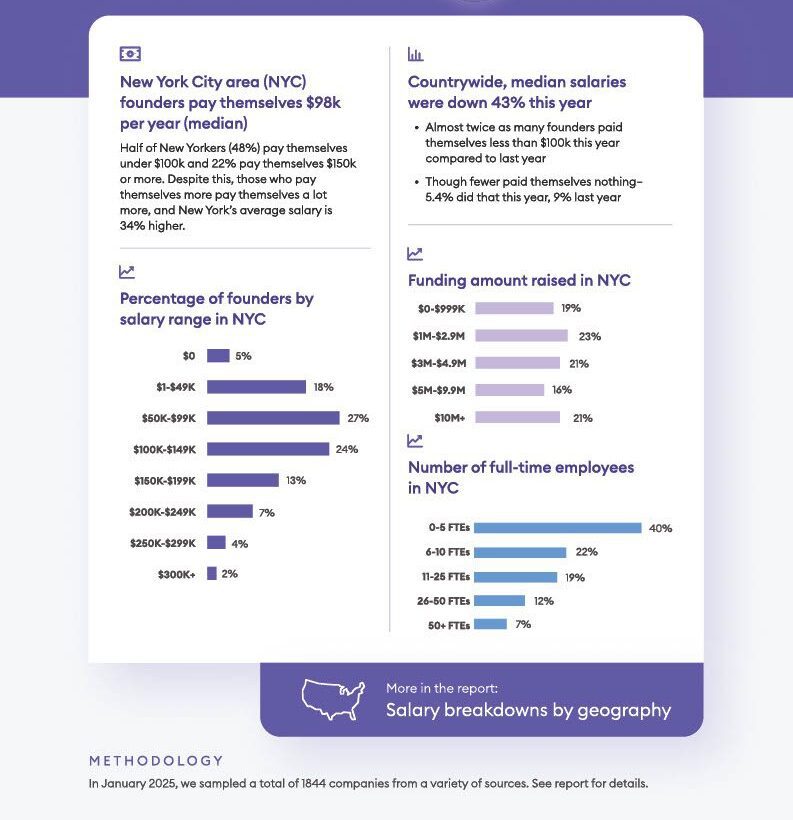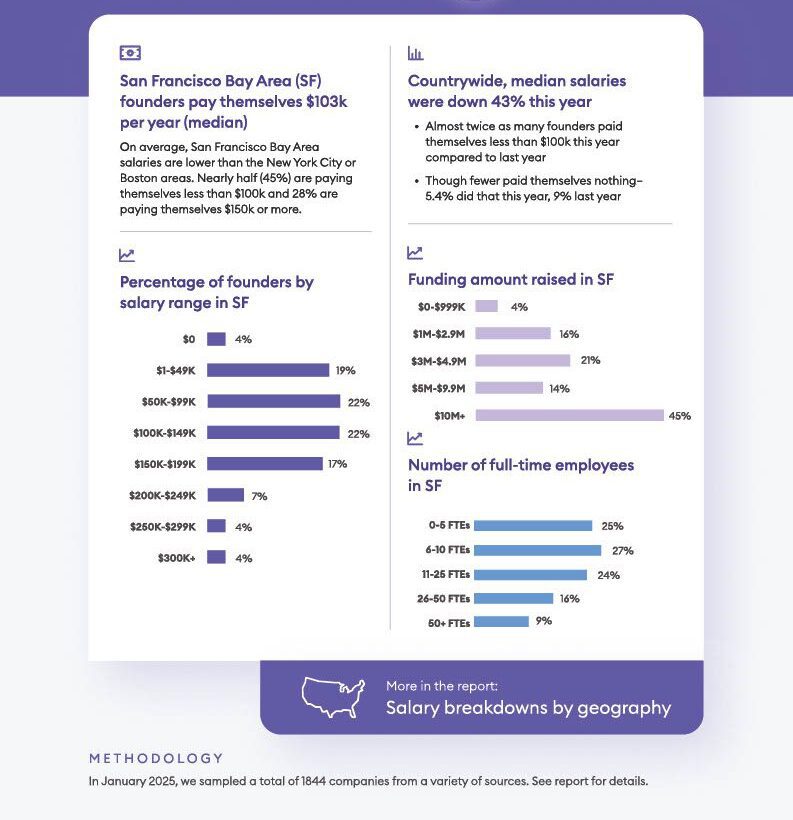In the gleaming coworking spaces of America’s tech hubs, a quiet financial revolution is underway. The stereotype of lavishly compensated tech founders has given way to a new reality: austerity.
According to Pilot’s comprehensive 2025 Founder Salary Report, which surveyed 1,844 startup founders, entrepreneur compensation has plummeted a staggering 43% in just one year. The median founder now takes home just $75,000, down from $132,000 in 2024, marking one of the most dramatic shifts in startup economics in recent memory.
The New Austerity
Beyond the headline figure, Pilot’s report reveals the breadth of this compensation reset. Nearly twice as many founders now earn less than $100,000 compared to last year — 60% in 2025 versus 37% in 2024. This downward pressure on founder salaries coincides with tectonic shifts in the funding landscape.
With venture funding down significantly for early-stage companies and smaller deals, founders are responding by slashing their own compensation. When asked directly how they determine their pay, the most common response (31%) was straightforward: founders pay themselves “what the startup can afford.”
Write-in responses paint an even more vivid picture of this self-imposed austerity. The report includes actual comments from founders, with one noting they “prefer to fund operations,” and another explaining their salary as “the minimum I can get paid for TriNet to still allow me to have benefits.” These unvarnished statements reveal the daily trade-offs entrepreneurs make between personal stability and business viability.
The Bootstrapping Renaissance
The salary crunch coincides with another significant trend: bootstrapping is up 57% year-over-year, with 18% of founders now self-funding compared to 11.5% in 2024. This surge in bootstrapping reflects both necessity and strategy in a challenging fundraising environment.
Among bootstrapped founders, the median salary sits at just $60,000, a stark contrast to the $100,000+ typically seen at VC-backed startups in previous years.
Even more telling is that 80% of VC-backed founders now pay themselves in the $50-100K range, up from 57% last year. Even with investor backing, the days of generous founder compensation appear to be waning as the ethos of capital efficiency takes hold across the ecosystem.
The 11-Employee Threshold
Perhaps the most actionable insight from Pilot’s research is the identification of a critical threshold: founder salaries increase with company size but plateau after reaching 11-25 employees. This staffing level marks the transition point where founders can begin paying themselves a more sustainable wage.
The data is striking. Founders with 0-5 employees report a median salary of $55,000, while those with 11-25 team members earn $100,000 — nearly double. Yet scaling beyond this point shows diminishing returns for founder compensation, with the median salary for companies with 26-50 employees only incrementally higher at $119,500.
This “livable salary milestone” provides founders with a tangible goal: build a team of at least 11 people to achieve personal financial sustainability.
Geographic Disparities Widen
Location continues to exert a powerful influence on startup economics. While the median salary for founders in the San Francisco Bay Area stands at $103,000, their counterparts in “Other US” regions make do with just $65,000. Boston ($93,000) and New York ($98,000) maintain their positions as high-compensation hubs, while Texas founders report median earnings of $70,000.


These regional differences highlight not just varying costs of living, but different funding environments and business models. Areas with more bootstrapped companies tend to show lower founder compensation, creating ecosystems where financial austerity becomes self-reinforcing.
Industry and Business Model Impact
The report reveals significant variation across industries and business models. B2B founders command substantially higher compensation ($120,000 median) than their B2C counterparts ($82,000), likely reflecting more predictable revenue streams and shorter sales cycles.
Sector-specific data shows IT, software, and technology founders earning a median of $96,000, while consumer goods founders make do with $55,000. Climate and environment-focused startups show surprisingly robust founder compensation at $86,250 median, potentially reflecting increased funding in climate tech.
The Generational Divide
One of the report’s most counterintuitive findings concerns age demographics. Younger founders (20-29) command higher salaries ($80,000 median) than their middle-aged counterparts (40-49, $65,000 median). This generational inversion suggests a profound shift in how newer entrepreneurs view the relationship between personal sacrifice and business building.
Where previous generations might have worn financial austerity as a badge of honor, younger founders appear more inclined to prioritize sustainable personal economics alongside company growth.
The AI Exception
While most sectors show declining compensation, artificial intelligence stands as a notable exception. AI founders report a median salary of $90,000 — 20% higher than the overall average. With AI startups making up 40% of surveyed companies (up from just 14% last year), this sector bucks the downward trend.
The AI premium reflects not just abundant funding, but intense competition for specialized technical talent. Many AI founders come from high-paying technical roles and face significant opportunity costs when launching ventures.
Building Sustainability Into Startup Culture
The drastic reduction in founder compensation raises important questions about entrepreneur wellbeing and long-term sustainability. While financial sacrifice has always been part of the startup mythology, the current extent of salary compression may prove unsustainable for many.
For today’s entrepreneurs, Pilot’s data offers both validation and benchmarking. The report transforms abstract concepts like “founder-friendly” and “runway extension” into concrete salary figures, giving entrepreneurs a framework for making often difficult compensation decisions.
The survey includes an actual founder comment noting: “Taking a high but fair salary doesn’t impede growth if you’re profitable.” Finding this balance, between personal financial health and company strength, may be the defining challenge for startup founders in 2025.

